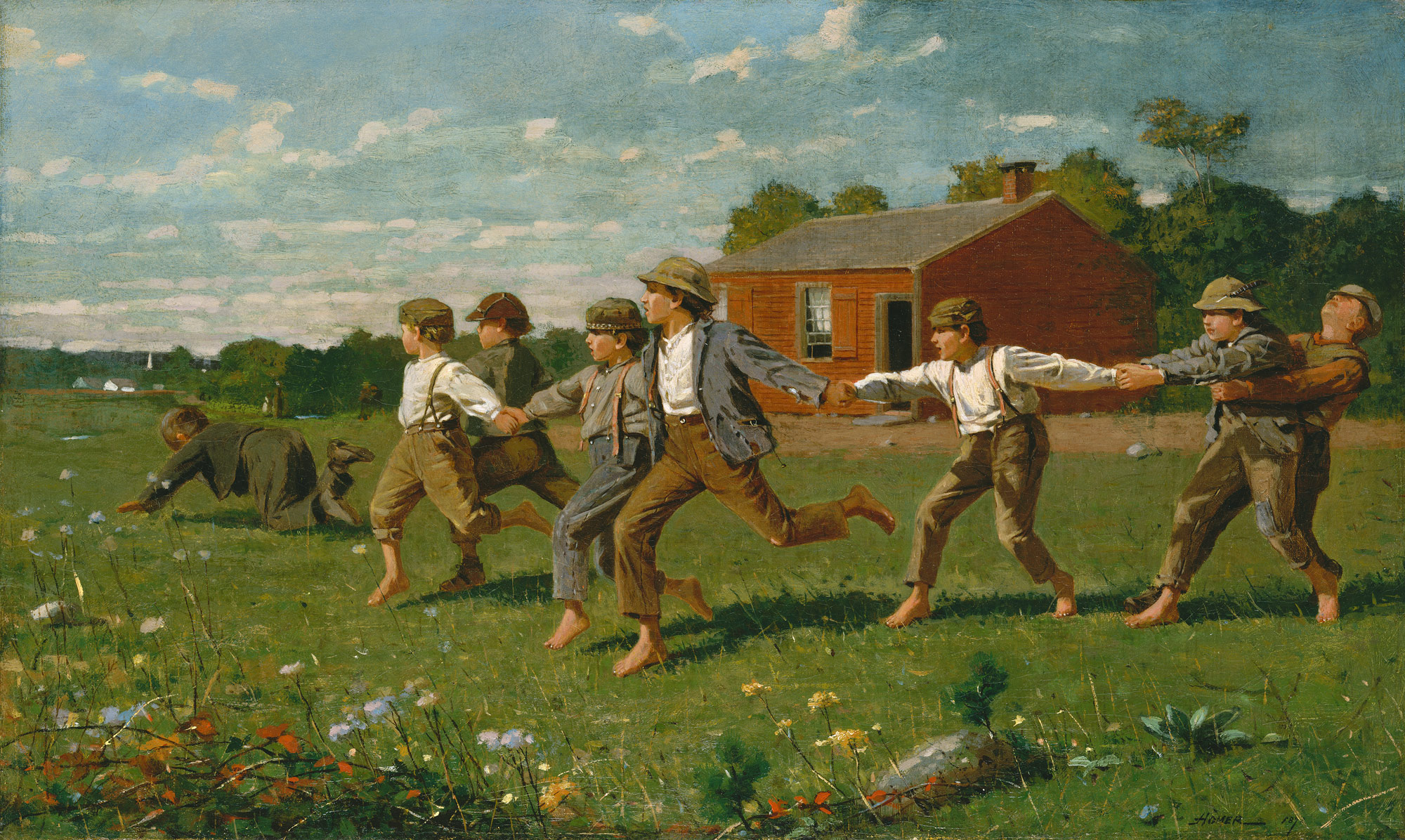Herman Melville, "The Wheelbarrow," Moby-Dick
...however we may justify certain exclusive habits in populous places, they are strikingly and confessedly ridiculous in the wilderness. What can be more absurd than a feeling of proud distinction, where a stray spark of fire, a sudden illness, or a day's contre-temps, may throw you entirely upon the kindness of your humblest neighbor?
Caroline Kirkland, A New Home, Who'll Follow? (1839)
As our reading of Moby-Dick had us following Queequeg and Ishmael setting out to join the crew of The Pequod, we also took on Caroline Kirkland's remarkable 1839 A New Home, Who'll Follow?--a fictionalized, realistic, and humorous account of her adventures as a settler in the wilds of Southeast Michigan. Both offer reminders of the need for an ethics of care and community in the face of difference and difficulty.
And student transmediations for this day highlighted some of that feeling of community (and its precarious connections):
Image: Winslow Homer, Snap the Whip

Music: The Decemberists, "Don't Carry It All"
https://www.youtube.com/watch?v=eDO4bzFWewk
But then the text transmediation also moves us perhaps to an older, more violent, and certainly more Queequeg-like religious ethos:
TEXT:
excerpt from end of Book V of Gilgamesh
(Stephen Mitchell's 2004 "New English Version" pg 128-129)
A gentle rain fell onto the mountains.
They took their axes and penetrated
deeper into the forest, they went
chopping down cedars, the wood chips flew,
Gilgamesh chopped down the mighty trees,
Enkidu hewed the trunks into timbers.
Enkidu said,
[…]
“We have chopped down the trees of the Cedar Forest,
we have brought to earth the highest of trees,
the cedar whose top once pierced the sky.
We will make it into a gigantic door,
a hundred feet high and thirty feed wide,
we will float it down the Euphrates to Enlil's
temple in Nippur. No men shall go through it,
but only the gods. May Enlil delight in it,
may it be a joy to the people of Nippur.”
They bound logs together and built a raft.
Enkidu steered it down the great river.
Gilgamesh carried Humbaba's head.
________
When I first encountered this text as a graduate student in the Bronx, sitting in Joanne Dobson's seminar on 19th century women writers, I had little reason to believe then that twenty years later, I'd be living and teaching just a few miles down the road from Kirkland's SE Michigan settlement. The book became something of a favorite of mine, capturing something of the sectional dislocation I experienced as a southerner in the Big Apple. Now that I am living and teaching in the Midwest, it continues to offer a chance for me and students to experience local literature in a global/glocal age.
A scene early in the text, highlights the vexed nature of such local/global encounters when Mrs. Clavers (Kirkland's narrator and alter-ego) is tasked with naming the new village. The plot would be drawn up, "lithographed and circulated through the United States, and, to cap the climax, printed in gold, splendidly framed, and hung up in Detroit, in the place 'where merchants most do congregate.'" Faced with the pressure of posterity, of wide circulation, and the judgment of her friends and readers back East, Mrs. Clavers quips, "I tried for an aboriginal designation, as most characteristic and unworn. I recollected a young lady speaking with enthusiastic admiration of our Indian names, and quoting Ypsilanti as a specimen." She settles on Montacute, drawn she says from her literary reading, underscoring the narrativizing and fictionalizing of US settlements.
The earlier joke about Ypsilanti resonates differently when one lives and works in Ypsilanti (home to Eastern Michigan University), of course. As a conflation of civic place, native space, and an international figure of democracy--General Georges Ypsilanti, one of the heroes of the Greek War of Independence--the anecdote points to the strange collision of local and global discourses--and its long history in our own readerly backyards--that is always potentially present in the American Renaissance. The question of 'the American' or 'America' is posed simultaneously (and continually) against both small and large points of contact. Not just asking what the shape of that new home will be--but who gets to inhabit it.
No comments:
Post a Comment